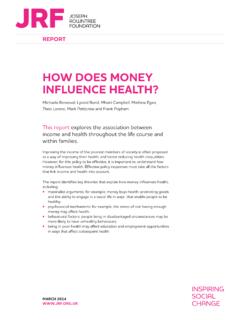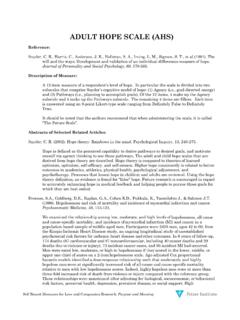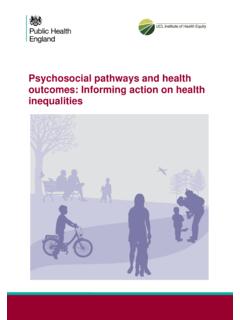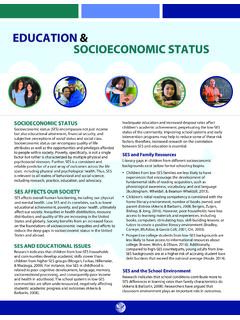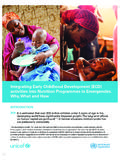Transcription of Mental Health Psychosocial Support - GOV.UK
1 OFFICIAL. An Approach and Theory of Change to Mental Health and Psychosocial Support for global development actors Photo credit: Anna Dubuis /DFID. Inside a UNICEF child friendly space, supported by UK aid, at Batukhali refugee camp in Bangladesh, art therapy and counselling help Rohingya children recover from the trauma they have experienced. AUGUST 2020. OFFICIAL. Contents The Challenge ..3. The Opportunity is Guiding Vision and Principles ..5. Theory of Change Diagram ..7. Theory of Change Narrative ..9. Measuring Impact ..17. Annex A: Important Definitions ..19. References ..20. 2. OFFICIAL. The Challenge Mental Health is a fundamental part of being human, covering a full continuum including everyday well-being, psychological distress, Mental Health conditions and Psychosocial disabilities. One in four people will develop a Mental Health condition in their lifetime.
2 Together, Mental Health , neurological and substance use (MNS) conditions are the number one cause of years lived with disability (YLDs) worldwide and are the basis for an estimated 10-13% of all disability-adjusted life years (DALYs)1,2. The number of people with MNS conditions is expected to increase dramatically as population sizes and life expectancies rise in low and middle-income countries (LMICs)3. People with Mental Health conditions and Psychosocial disabilities face major challenges in having their rights recognised. The Human Rights Council states Mental Health systems and policies around the world are in crisis , with evidence of violations of economic, social and other rights and practices like chaining and shackling all too common-place in Mental Health services4. Mental Health continues to be one of the most neglected and underfunded development issues of our time5.
3 Many people in LMICs will never access essential Mental Health or social care services in their lifetime, and for those who do, the quality of services is often poor. Public expenditure in these contexts is extremely low and often inequitably and inefficiently allocated6,7. Over 80% of LMICs' limited Mental Health spend goes towards running inpatient psychiatric institutions rather than being distributed across a more balanced model of care with services closer to the community8,9. Mental Health workers are scarce, for example, Liberia and Sierra Leone each have only one psychiatrist currently practising10. Organisations led by service users and people with Psychosocial disabilities, including those advocating for rights, are largely under-supported. There is a strong association between poverty, inequalities and poor Mental Health .
4 This relationship occurs through multidirectional pathways that can start early in the life course and produce a cycle of disadvantage 11. This relationship is also the product of intersecting social, political and economic determinants that produce both poverty and ill Health (see Figure 1). There is also a strong association with physical Health and preventable deaths including maternal suicide, now classified as a direct cause of maternal mortality and a leading contributor to deaths in pregnancy and the postnatal period12. 3. OFFICIAL. It is also important to address the Mental Health needs of particular populations and vulnerable groups. WHO estimates a 22% prevalence of Mental Health conditions (depression, anxiety, post-traumatic stress disorder, bipolar disorder, and schizophrenia) at any point in time in conflict-affected populations13.
5 Globally, attention to prevalence by age is also important as children and young people in vulnerable circumstances are at increased risk14. Suicide is the second leading cause of death among those aged 15-29 globally15. There are significant gender disparities in Mental Health and social risk factors are highly gendered16. Figure 1: The vicious cycle of poverty and Mental ill- Health Source: Mental Health and Poverty Project/The Lancet17. The purpose of this document is to shine a spotlight on the role development can play to improve Mental Health and wellbeing for all, and in turn, how improved Mental Health can play a role in attaining key developmental outcomes. As such it recognises that there cannot be full development or healthy lives without addressing Mental Health . It sets out for the first time how development actors can maximise aid portfolios to strengthen their contribution to Mental Health and wellbeing in some of the world's poorest countries.
6 It aims to inform policies and programmes by providing a conceptual framework with clear pathways for change. In doing so, this paper also touches on how integrated and quality Mental Health interventions can positively impact wider development outcomes. This Theory of Change is the result of a consultative process between development and humanitarian practitioners and an external working group of critical friends, including groups representing people with Mental Health conditions and Psychosocial disabilities. We want to thank the external group for sharing their learning and know how and for challenging this approach through a series of workshops between December 2018 and July 2019. 4. OFFICIAL. The Opportunity is Now Mental Health is more than a Health issue, it's an issue for wider human rights, development and humanitarian actors.
7 The SDGs provide a historic opportunity' to reframe and broaden the global Mental Health agenda, recognising Mental Health as an accelerator for wider development goals like learning, early childhood development and maternal health11. This requires a paradigm shift, moving away from a narrow medicalised focus on closing the treatment gap, to also address the quality of services and underlying social determinants across the full continuum of Mental Health and wellbeing. This was a focus in the UK co-hosted Global Ministerial Mental Health Summit that sought to galavanise global action and sharing of good practice. Important policy shifts across the international system attest to this change in thinking. The WHO Comprehensive Mental Health Action Plan 2013 202018 (now extended to 2030) includes the promotion of Mental Health through action on social determinants as one of its five key objectives.
8 The Human Rights Council 201919 emphasises the need for a combined focus on social determinants and rights, recognising States'. obligations to create and sustain specific conditions that promote a life of dignity and wellbeing for all. The Lancet Commission on Global Mental Health and Sustainable Development in 2018 recognises the SDGs as an opportunity to reframe global Mental Health as: i) a global public good ii) a continuum iii) the unique product of social and environmental influences and iv) a fundamental human right. In 2019, the Political Declaration on Universal Health Coverage attested to a renewed global commitment from heads of governments to implement measures to promote and improve Mental Health and well-being as an essential component of universal Health coverage with specific mention to addressing social determinants and fully respecting human rights20.
9 Guiding Vision and Principles A common, overarching vision was identified through this consultative process, one where: All people enjoy the highest attainable standard of Mental Health and wellbeing and all people with Mental Health conditions and Psychosocial disabilities can exercise their full rights on an equal basis to others.. The Vision is integral to meeting the commitments set out in: The UN Sustainable Development Goals (SDGs) that emphasise promotion of wellbeing and healthy lives The UN Convention on the Rights of Persons with Disabilities (CPRD) on legal protection of rights and dignity of people with Psychosocial disabilities 5. OFFICIAL. WHO's Mental Health Action Plan 2013-2020 (extended to 2030); on the development of policies and plans in line with international and regional human rights instruments.
10 The following principles were identified to guide development practitioners: Participation. Participation is a core principle and requisite of a human rights- based approach. This means putting people at the centre of decision making on their own Health and lives - as well in policy, research, and services. Human Rights and dignity. A rights-based approach offers an alternative to narrow and individualised disease-oriented approaches. It encompasses individual rights and capacity building as well as systems level change21. Comprehensive, integrated and responsive services: Supporting the long- term process of deinstitutionalisation and the reorientation of quality services closer to communities; implementing people-centred, recovery-oriented approaches; and monitoring and protecting human rights using standards. Quality: Adopting evidence-informed practices to Support comprehensive interventions, services and continuity of care.










